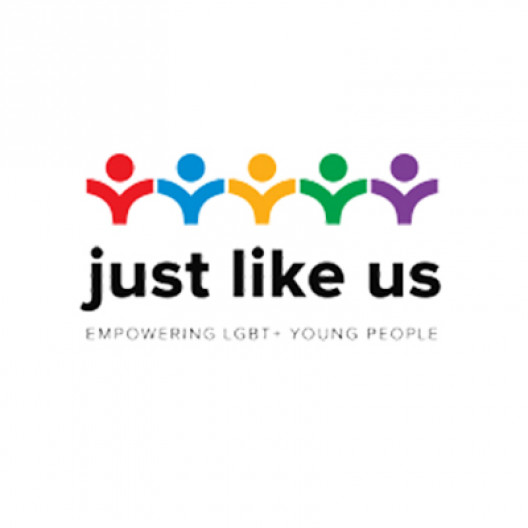
Bringing LGBTQ+ Representation and Equality to Young People: An Interview with Dominic Arnall
Just Like Us is a UK-based charity working to equip children with the LGBTQ+ representation and tools to champion equality that many LGBTQ+ people previously have never had growing up. It was founded on the simple fact that growing up LGBTQ+ can be incredibly tough, and that something needs to be done about this. George Wright from myGwork spoke to Dominic Arnall, the CEO of Just Like Us, to find out more about the work they're doing and his thoughts on supporting LGBTQ+ youth.
Can you tell us a little bit about yourself, and the work Just Like Us do?
I’m Chief Executive of Just Like Us, the LGBT+ young people’s charity. At Just Like Us, we work with young people to champion LGBT+ equality. We do this by running a series of programmes aimed at LGBT+ young people.
I joined the charity in February 2020, two weeks before nationwide lockdown, which meant my first major decision was sending everybody home, “just for a couple of weeks to see how things pan out”
What’s your story, and how did you come to be involved with Just Like Us?
I had a pretty horrible school experience and ended up leaving at 17 to become a care assistant in a home for people with learning disabilities. It was a wonderful job and it got me started in the charity sector, but it didn’t have many opportunities for advancement so I ended up returning to education as a mature student and graduating at 28.
I continued to work in the disabilities sector for the next 7 years, eventually working in a learning and development and programme management role for a UK-wide disabilities charity. I always had one eye on the LGBT+ sector and leapt at the chance to join Stonewall in 2015 as Head of Projects and Programmes. At Stonewall, I led their education programmes work before also taking on international programmes and leading their projects in the Western Balkans and Turkey and Russia and Eastern Europe.
After Stonewall, I joined Mind as Head of Programme management for the mental health campaign Time to Change, before joining Just Like Us as Chief Executive a year and a half ago. I also served two years as trustee and Chair of LGBTQ mental health charity Mind Out.
Currently, what is Just Like Us working on to support LGBTQ+ representation in schools?
Currently, Just Like us is sending our young volunteers into schools across the nation as well as working to expand our pride groups programme and just starting to gear up for School Diversity Week 2022.
What do you think are some of the biggest challenges in running a charity?
Being a CEO is an interesting job, you don’t really have any peers so you get used to working on your own, though I have a fantastic trustee board and a chair supporting me and a brilliant senior Leadership team within the organisation.
In terms of external challenges, to some extent, they are the same as they have always been in LGBT+ equality, homophobia, biphobia and transphobia.
What do you think is the benefit of LGBTQ+ inclusion in schools?
Our research shows that schools that take part in LGBT+ inclusion initiatives the mental wellbeing of young people are better - whether they re LGBT+ or not. There’s something it seems about telling young people that who they are is something to be celebrated and not ashamed of that improves their mental health. Who knew, right?
Who were your role models, growing up?
Stephin Merritt from The Magnetic Fields meant (and means) the world to me. I heard his song “I thought you were my boyfriend” and almost fell off my chair. I had never heard anyone speak so directly about same-sex relationships. I also loved a predictable series of 80’s heroes and anti-heroes, mostly in music. David Bowie, Peter Murphy, Andrew Eldrich. If you know, you know.
What does being CEO of Just Like Us involve?
As CEO I’m responsible for all aspects of managing Just Like Us including leading strategy and budgets through to line managing the Senior Leadership team. A lot of it practically is about being where you are needed the most, giving critical support where it is needed. A charity like Just Like Us has a lot of talented staff, my role is to support them while not getting in their way (too often).
If you were Minister of Education for the day, what one policy would you implement or change?
I would encourage my department to put the voices of school staff and young people at the centre of their work. There has always been a disconnect between education policy and education practice, there are lots of possible solutions to this, many have been tried but lots haven’t. In an ideal world, my lack of teaching experience would prevent me from ever having the role, though this isn’t the case at the moment.
What would you recommend to teachers looking to increase LGBTQ+ representation in their teaching and at their schools?
Firstly, don’t worry if you need to ask for help. At just Like Us we have a number of programmes dedicated to making this easy, even if you know nothing about LGBT+ people. Secondly, prioritise the voices of LGBT+ young people in your school, if you don’t know any LGBT+ young people in your school, it’s important you take steps to look at why they don’t feel safe to come out.
How can people get involved and support Just Like Us?
Come over to our website at www.justlikeus.org or follow us on social media @JustlikeusUK.

